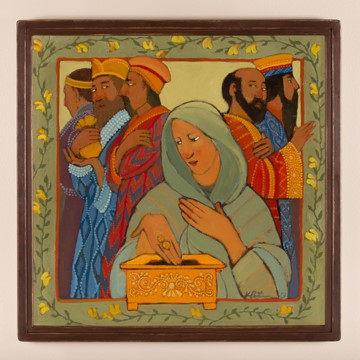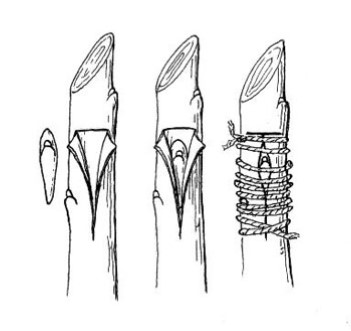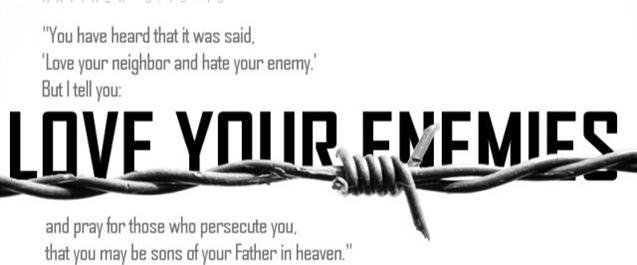 [We reprint this article with permission from Sam Williamson’s blog Beliefs of the Heart because it captures a great sense of what it means to approach our world with a positive, missional vision. ]
A friend of mine challenged me to adopt—perhaps embrace—a Transcendent Pursuit for the coming year, something life changing, something I can bring to the world to make a difference.
[We reprint this article with permission from Sam Williamson’s blog Beliefs of the Heart because it captures a great sense of what it means to approach our world with a positive, missional vision. ]
A friend of mine challenged me to adopt—perhaps embrace—a Transcendent Pursuit for the coming year, something life changing, something I can bring to the world to make a difference.
Then I re-read the first chapter of Genesis. It felt like I was reading it for the first time, and I felt the nudge of God.
The first thing I noticed was the creative artistry of God. The opening verses do not focus on God’s unparalleled power. Instead they reveal—and almost revel in—the beauty. After each creative act God doesn’t say, “That was powerful;” he says, “This is beautiful” (a better translation than what we are used to).
Next I noticed that God sees potential where no one else ever could. God hovers over and looks into the chaos and void; he takes the raw materials of darkness and depth, and he creates light, and it is beautiful. As are the oceans and fields and skies.
After observation and creation, God gives. He gives this unparalleled treasure of creation to man. The opening chapter of the Bible surges with swarming fish, teaming land animals, luscious vegetation, and a sky pregnant with stars.
And God turns to man and says, “It’s yours. Take it. Care for it. Love it.”
The opening of the Bible reveals a completely different God than any man has ever created. The opening of the Bible reveals God as an artist, seeing beauty, creating incomparable art, and giving it away. It is a radical image of God.
I long to live like that artist
Seeing God as the creator—not merely powerful but a creator of beauty—moved me. It makes me want to be more like him in a selfless giving of light, life, and joy. And then I read the next few verses.
God makes man in his own image. God revels (imagine a reveling God!) in this description of human design: “Let us make man in our image, after our likeness … God created man in his image … in his own image he made him” (Gen. 1:26-27).
It is almost as if God needed an editor to say, “Uh, God, you are being redundant.” But God wasn’t writing useless repetition. He was being emphatic. He wanted us to know—he needed us to know—that his image is the blueprint of our design.
God’s first act is to make us his masterpiece—his literal artistic crown of creation—and his second act is to make us artists as well. He animates his masterpiece, breathing into us a creative force to see beauty, create incomparable art, and give it away.
When he puts us in the Garden of Eden—asking us to dig the earth, rule creation, and name the animals—God is inviting us to join with him as creative comrades. He enters into partnership with us as we artistically cultivate and nurture this world.
What is the church meant to be?
When God gave his creation to mankind, he said, “Subdue it and have dominion.” But these words do not mean to invade earth like a conquering king—God spoke these words before the fall. They don’t mean subjection, they mean cultivation.
The church—God’s people on earth—are meant to be gardeners, maybe a guild of gardeners. We are here to create the Garden of Eden, to cultivate and nurture. To create an environment of peace and life, joy and light, and hope.
How do we cultivate each other? We begin to see the unseen. We learn to spot beauty in each other. We become gardening treasure hunters; recognizing the raw materials of gifts and passion in each other and speaking it into life: “I see this in you; it is beautiful.”
We are called to be an Army of Artists or Guerilla Gardeners. We win the world through the cultivation of a Garden. The church on earth is that collection of artistic gardeners who are cultivating the Garden of Eden, bringing light and beauty.
The Christian life is joy, light, and creation in comradeship with the creator of all.
Don’t confuse the Garden shed with the Garden
Religious groups can frustrate me. I get sick of the same weekly board (or perhaps bored) meeting, or the memo to write, or the program to manage. I say to myself (and sometimes to my wife), “This can’t be God’s plan for his people! There has to be more!”
This week I realized my problem: I’ve been confusing the garden shed with the garden.
God’s people—this guerilla band of gardeners—are here on earth to cultivate His garden. But I’ve been tripping over the spades, hoes, pickaxes, and rakes. They are just tools. They are used to create the garden, but they aren’t the garden.
If my primary experience of God’s people is frustration, it might be time to let go of a gardening tool—that spade of board membership or that pickaxe of the program I manage. All our programs, plans and meetings are simply tools to cultivate the garden.
Sometimes I feel we cannot see the garden for the shed. When the tools are creating blisters, it’s time to lay them down. It’s the garden we are creating, not a tool shed.
Creation and re-creation
When Christ came into the world, scripture says of him that “a bruised reed he will not break … [and yet] he will faithfully bring forth justice” (Is. 42:3).
Christ came to earth as the ultimate guerilla gardener; he brought justice not through violent invasion but through violent gardening, through aggressive art.
After the fall of man—after we rebelled against his creative design—God again hovered over the dark void of the earth and saw what we could be if brought back to life. By sending his son, he again proclaimed, “Let there be light,” and it was beautiful.
I long to live my life like that Artist.
Sam


 Ed. Note: Ned and his family moved here from Minneapolis to be part of the The Word of God for a few years in the 1980’s.
Ed. Note: Ned and his family moved here from Minneapolis to be part of the The Word of God for a few years in the 1980’s.

 You did not choose me, but I chose you and appointed you to go and bear fruit—fruit that will last...
You did not choose me, but I chose you and appointed you to go and bear fruit—fruit that will last...

 I tell you the truth, unless a kernel of wheat falls to the ground and dies, it remains only a single seed. But if it dies, it produces many seeds. John 12:24
I tell you the truth, unless a kernel of wheat falls to the ground and dies, it remains only a single seed. But if it dies, it produces many seeds. John 12:24
 We know that Jesus’ last directive to his disciples was ‘Go and make some more’! Whatever else His Body is to be about, it should certainly be making disciples. But most of us, and I include myself here, feel that is is a bit over our head. Yes, SOMEBODY should be making disciples. There must be experts who can be especially devoted to this task, which is good, because we feel inadequate.
The idea of forming a completely mature, fully trained, widely experienced disciple is daunting! But fortunately, that is not the task laid on each of us individually. The challenge of raising up disciples who can raise up other disciples is the calling of the whole Body – together. Each of us have a part to play in this: raising our children, maybe working with just one or two people, or maybe just adding to the grow of a fellow disciple is some small way.
We know that Jesus’ last directive to his disciples was ‘Go and make some more’! Whatever else His Body is to be about, it should certainly be making disciples. But most of us, and I include myself here, feel that is is a bit over our head. Yes, SOMEBODY should be making disciples. There must be experts who can be especially devoted to this task, which is good, because we feel inadequate.
The idea of forming a completely mature, fully trained, widely experienced disciple is daunting! But fortunately, that is not the task laid on each of us individually. The challenge of raising up disciples who can raise up other disciples is the calling of the whole Body – together. Each of us have a part to play in this: raising our children, maybe working with just one or two people, or maybe just adding to the grow of a fellow disciple is some small way.
 As we get ready to celebrate Pentecost again this Sunday I am reminded once more that Jesus connects the gift of the Spirit with our participation in his mission. We are familiar with the Acts 1:8 passage, but let’s also remember John 20: 21&22
As we get ready to celebrate Pentecost again this Sunday I am reminded once more that Jesus connects the gift of the Spirit with our participation in his mission. We are familiar with the Acts 1:8 passage, but let’s also remember John 20: 21&22

 When I was an undergraduate I had a job in a thoroughbred frog farm at the University of Michigan. You laugh, but we had frogs whose ancestors could be traced back through dozens of generations! They might have looked like ordinary Rana Pipiens but these were strictly blue-blood, or maybe green-blood, amphibians. My role was very small, only a few hours per week, but I had been invited to be part of the team by the foremost ‘frog man’ in the world, the professor directing the lab.
You might wonder why bother selectively breeding frogs. It turns out that it is very important for some forms of research, including vital medical and genetic research, to be able to trace the genealogy of test subjects, including frogs. We were not really in the business of making pedigree frogs, but of curing illnesses and advancing the scientific frontier, and I got a chance to be part of it all. Seen in that light, my small and lowly contribution takes on more significance and dignity.
When I was an undergraduate I had a job in a thoroughbred frog farm at the University of Michigan. You laugh, but we had frogs whose ancestors could be traced back through dozens of generations! They might have looked like ordinary Rana Pipiens but these were strictly blue-blood, or maybe green-blood, amphibians. My role was very small, only a few hours per week, but I had been invited to be part of the team by the foremost ‘frog man’ in the world, the professor directing the lab.
You might wonder why bother selectively breeding frogs. It turns out that it is very important for some forms of research, including vital medical and genetic research, to be able to trace the genealogy of test subjects, including frogs. We were not really in the business of making pedigree frogs, but of curing illnesses and advancing the scientific frontier, and I got a chance to be part of it all. Seen in that light, my small and lowly contribution takes on more significance and dignity.
 St. Patrick’s Day, 1907 off ‘the Lizard’, a mile long reef extending south from the coast of Cornwall, Great Britain, a huge storm was raging. This is the region where the North Atlantic smashes into the English Channel and is notorious for its tides and currents, known as the graveyard of ships. The SS Suevic, 12,000 tons, sailing from Melbourne was just hours away from its destination in Plymouth. The officers couldn’t see the stars to navigate, but they thought they saw the Lizard Lighthouse ten miles off and so in misplaced confidence proceeded full-steam ahead to reach port by next morning. It turned out that they were actually right on the Lizard rocks and crashed onto the reef so hard that they were unable to extricate themselves. The 141 crew and 382 passengers, 60 of them under 3 years old were ruined.
Ruined
Advent is not simply a run-up to Christmas. It is a time to rehearse the great Biblical truths. Ephesians 2 reminds us that before Jesus came ...
St. Patrick’s Day, 1907 off ‘the Lizard’, a mile long reef extending south from the coast of Cornwall, Great Britain, a huge storm was raging. This is the region where the North Atlantic smashes into the English Channel and is notorious for its tides and currents, known as the graveyard of ships. The SS Suevic, 12,000 tons, sailing from Melbourne was just hours away from its destination in Plymouth. The officers couldn’t see the stars to navigate, but they thought they saw the Lizard Lighthouse ten miles off and so in misplaced confidence proceeded full-steam ahead to reach port by next morning. It turned out that they were actually right on the Lizard rocks and crashed onto the reef so hard that they were unable to extricate themselves. The 141 crew and 382 passengers, 60 of them under 3 years old were ruined.
Ruined
Advent is not simply a run-up to Christmas. It is a time to rehearse the great Biblical truths. Ephesians 2 reminds us that before Jesus came ... The first boats arrived just in time to avert a disaster. The Suevic had launched two of its own lifeboats filled with women and children. There was no way that they could safely negotiate the channel through the rocks to shore, so local men jumped into the boats to guide them. When these inadequate boats tried to return, they were smashed on the rocks.
The first boats arrived just in time to avert a disaster. The Suevic had launched two of its own lifeboats filled with women and children. There was no way that they could safely negotiate the channel through the rocks to shore, so local men jumped into the boats to guide them. When these inadequate boats tried to return, they were smashed on the rocks.
 I get the image of shafts of incredibly hard glass that have been driven down into our world. We go struggling along in our solid-seeming-but-really-a-mist world and we bump up against these unseen-but-imperishable kingdom shafts. They are what is ‘really real’, not the mist which consumes our attention. We can choose to step into those shafts of kingdom life in Jesus, but we can’t yet stay in them continuously. They don’t yet fill everywhere. That is why we pray ‘thy kingdom come, thy will be done’. Drive more kingdom shafts into this reality. Make the kingdom more contiguous until the day you bring the whole kingdom crashing in at your return!
I get the image of shafts of incredibly hard glass that have been driven down into our world. We go struggling along in our solid-seeming-but-really-a-mist world and we bump up against these unseen-but-imperishable kingdom shafts. They are what is ‘really real’, not the mist which consumes our attention. We can choose to step into those shafts of kingdom life in Jesus, but we can’t yet stay in them continuously. They don’t yet fill everywhere. That is why we pray ‘thy kingdom come, thy will be done’. Drive more kingdom shafts into this reality. Make the kingdom more contiguous until the day you bring the whole kingdom crashing in at your return!
 John in his brief second letter seems to be writing to a church undergoing some duress. Exactly what the issues are we have to deduce from the letter, but what strikes me is John’s instruction to the church. Basically what he has to say is, “when the going gets tough, love one another”. This is the commandment we had from the beginning, this is the one to stick with when things are unclear or when the pressure is mounting or you don’t know what to do – love one another.
As I was discussing this with some brothers and sisters in our Bible study recently, I was struck with how relevant this is for us in The Word of God right now. We are trying to clarify our vision and move into a more missional direction. Some things are changing, some things are not, and nothing is flowing with breathtaking power. In the midst of this do we grow impatient, lose heart, give up? John tells us what to do – go back to the basics and love one another.
John in his brief second letter seems to be writing to a church undergoing some duress. Exactly what the issues are we have to deduce from the letter, but what strikes me is John’s instruction to the church. Basically what he has to say is, “when the going gets tough, love one another”. This is the commandment we had from the beginning, this is the one to stick with when things are unclear or when the pressure is mounting or you don’t know what to do – love one another.
As I was discussing this with some brothers and sisters in our Bible study recently, I was struck with how relevant this is for us in The Word of God right now. We are trying to clarify our vision and move into a more missional direction. Some things are changing, some things are not, and nothing is flowing with breathtaking power. In the midst of this do we grow impatient, lose heart, give up? John tells us what to do – go back to the basics and love one another.


 [We reprint this article with permission from Sam Williamson’s blog
[We reprint this article with permission from Sam Williamson’s blog 
 You may well be like me – more committed to the IDEA of evangelism than to actually DOING evangelism. I want to see it happen, but feel most comfortable with others making it happen. Actually, Jesus, the master evangelist, gave his disciples – that includes us – a fairly pain-free strategy for evangelism. I think I can do this!
Luke 10: 5-9 “When you enter a house, first say, ‘Peace to this house.’ If a man of peace is there, your peace will rest on him; if not, it will return to you. Stay in that house, eating and drinking whatever they give you, for the worker deserves his wages. Do not move around from house to house. When you enter a town and are welcomed, eat what is set before you. Heal the sick who are there and tell them, ‘The kingdom of God is near you.’”
You may well be like me – more committed to the IDEA of evangelism than to actually DOING evangelism. I want to see it happen, but feel most comfortable with others making it happen. Actually, Jesus, the master evangelist, gave his disciples – that includes us – a fairly pain-free strategy for evangelism. I think I can do this!
Luke 10: 5-9 “When you enter a house, first say, ‘Peace to this house.’ If a man of peace is there, your peace will rest on him; if not, it will return to you. Stay in that house, eating and drinking whatever they give you, for the worker deserves his wages. Do not move around from house to house. When you enter a town and are welcomed, eat what is set before you. Heal the sick who are there and tell them, ‘The kingdom of God is near you.’”
 This past February Barb and I got a chance to go to New Zealand, and I have to say it is just as spectacularly beautiful as we has expected. While there we visited the city of Napier. In 1931 it experienced a catastrophic earthquake. The buildings were leveled, the bluff overlooking the town collapsed, the lagoon was lifted out of the sea and a new set of hills emerged. As you can imagine, life in Napier was totally disrupted. Not only were institutions destroyed, but the landmarks and established lines of communication were lost.
People sometimes describe what we have been going through for the last several decades as a cultural earthquake, with good reason. Key aspects of life have been shaken, and many are collapsing or damaged. Institutions people relied on and landmarks they used for guidance such as marriage and family are gone. They now seem dangerous to return to. It is small wonder that we see so much disruption in lives and in society.
This past February Barb and I got a chance to go to New Zealand, and I have to say it is just as spectacularly beautiful as we has expected. While there we visited the city of Napier. In 1931 it experienced a catastrophic earthquake. The buildings were leveled, the bluff overlooking the town collapsed, the lagoon was lifted out of the sea and a new set of hills emerged. As you can imagine, life in Napier was totally disrupted. Not only were institutions destroyed, but the landmarks and established lines of communication were lost.
People sometimes describe what we have been going through for the last several decades as a cultural earthquake, with good reason. Key aspects of life have been shaken, and many are collapsing or damaged. Institutions people relied on and landmarks they used for guidance such as marriage and family are gone. They now seem dangerous to return to. It is small wonder that we see so much disruption in lives and in society.
 Looking for the KingdomFor a while now we have been focusing on the prayer Jesus taught us, ‘Thy kingdom come, Thy will be done on earth, as it is in heaven’. We have talked about longing for the kingdom, about being agents to bring the kingdom in the spheres where Jesus has placed us. We have prayed for the kingdom to come, joining with brothers and sisters across the County in the special time of the 40 Days of Prayer.
Looking for the KingdomFor a while now we have been focusing on the prayer Jesus taught us, ‘Thy kingdom come, Thy will be done on earth, as it is in heaven’. We have talked about longing for the kingdom, about being agents to bring the kingdom in the spheres where Jesus has placed us. We have prayed for the kingdom to come, joining with brothers and sisters across the County in the special time of the 40 Days of Prayer. Interplay of Kingdoms
Interplay of Kingdoms